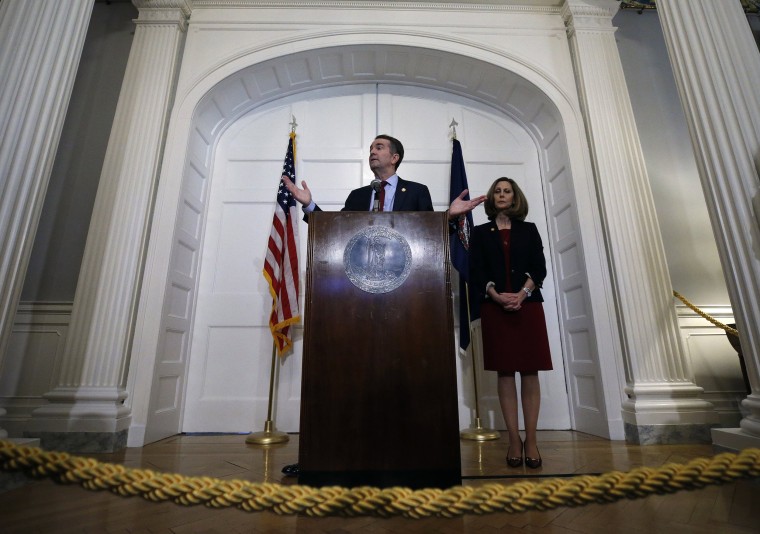In a Saturday news conference meant to save not just his political career but his reputation and social standing, Virginia Gov. Ralph Northam, a Democrat, spoke for more than 40 minutes about a racist image that appeared on his 1984 medical school yearbook page. He also admitted to darkening his face to portray Michael Jackson in a 1980s dance contest.
But at no point, ever, did Northam describe himself as a reformed racist or his own decision to engage in what he at one point called “face painting” as racist. Nor did he speak to the myriad ways in which racism infects American life in the present.
Northam, experts say, stuck to the now usual script for white Americans facing allegations of racism: Deny despite glaring evidence, and evade any mention of harm experienced by others. Instead, speak about the entire incident as a difficult personal experience to navigate, an opportunity for personal growth or, when necessary, a bit of both. And above all, insist that you are not a racist, and have never said or done anything racist.
“We like to think the racists are older, Southern, usually undereducated people who hold overt traditionally racist views and do things like freely use the N-word, or wear blackface,” said Eduardo Bonilla-Silva, a Duke University professor of sociology and author of “Racism Without Racists.”
“And by that standard, most whites are free of racism,” Bonilla-Silva continued. “So, this means that most people, specifically white people, are free to join the chorus, to call for Northam to resign.”
Bonilla-Silva believes that Northam should resign — a position shared by the Congressional Black Caucus, the Virginia Legislative Black Caucus, Former Virginia Gov. Douglas Wilder (a fellow Democrat), NAACP President Derrick Johnson and many others. But focusing only on the question of Northam’s political future avoids a real examination of the many forms racism takes and the reforms necessary to end it, Bonilla-Silva said.
“The problem is that racism is fundamental in the contemporary American landscape, fundamental and widespread but perhaps more subtle than the N-word and blackface,” he said. “It is not about a few bad apples, but the rotting tree.”

Angelique M. Davis, associate professor of political science and director of global African studies at Seattle University, also thinks Northam should resign. She found Northam’s apology unsatisfactory, particularly his claim that he had no knowledge that the picture had appeared on his yearbook page.
Davis, who has researched apologies, sees Northam’s mea culpa as a form of “racial gaslighting,” which she defines as denying, downplaying and reassigning blame in any discussion of racism. When most effective, it can shut down conversations about injustice and recast transgressors as victims.
“It was just all about him rather than those who are harmed by his actions,” Davis said. “It is a demonstration of white fragility. It’s ‘I can’t bear to be called a racist,’ when you actually did something racist.”
Racial gaslighting is common when white Americans — particularly politicians — make race-based apologies, Davis said.
She pointed to the eight states that have offered apologies for slavery, along with both houses of Congress. But each of those state and federal apologies have come in the form of a resolution, a statement of official feelings, not a law. None include a substantive list of promises to reform or address racial disparities limiting black life. The U.S. Senate’s apology resolution specified that it could not form the basis of reparations claims. The net effect is to construct the illusion of racial reconciliation and progress while limiting consequences for those who have benefited from wrong and hemming in future calls for justice, Davis found in her research.
For Americans trying to respond more effectively to racism, Bonilla-Silva suggested a thought exercise. When Northam donned blackface for the dance contest, there were people around him who said nothing. There was someone — Eastern Virginia Medical School says it was other students — who saw the medical school yearbook before publication and thought, that’s fine. (In fact, there were other examples of blackface in the yearbook beyond the one on Northam’s page.)
This pattern of inaction and apathy in the face of racism has massive cumulative effects. It should not shock that black Americans at every income level, insured and uninsured, receive lower-quality health care and live shorter lives, Bonilla-Silva said.
“Racism is not simply he who uses the N-word and wears a Klan hood,” Bonilla-Silva said. “There are new strategies for maintaining racial domination, and many people are involved.”
A bit of Bonilla-Silva’s evidence: We’ve known for some time that standardized tests are not the best indicator of academic performance in college, but some colleges and universities continue to consider them in admissions. They produce the outcome the majority wants, Bonilla-Silva said: White, middle-class and wealthy students are overrepresented at the nation’s most prestigious schools.
In another example, Bonilla-Silva pointed out that most Americans say bigotry remains a serious problem, but they continue to bank with corporations that decline mortgages to people of color at disproportionate rates, which can be explained by nothing other than race.
“We have the killing-me-softly version of racism, which still produces death,” Bonilla-Silva said.
But rather than addressing these systemic issues head-on, Americans prefer to handle limited racial crises, like the question of Northam’s future. And even these crises are subject to partisan whims. The conservative outlet that surfaced Northam’s yearbook page, Big League Politics, has written little about President Donald Trump’s statistically unsupported comments on immigrants and crime.
“The governor may be forced to resign,” Bonilla-Silva said. “Then we will put away race for three days until Trump says something and we will be like, ‘Can you believe that?’ In the post-civil rights era it is easy to have these racial fires and then we put them away. But the fires exist because the tinder exists all over the place.”


